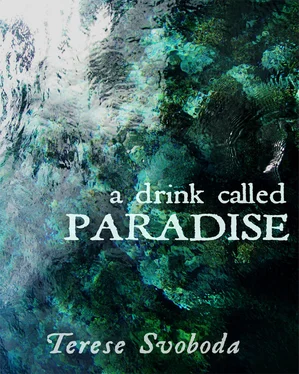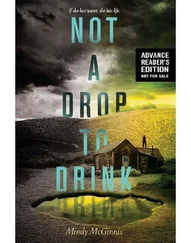I sit on the porch wearing a taro-leaf poultice and between throbs I think. Barclay sits on the porch too, for once here, and without a poultice. But he is slow today, very slow, and as soon as he sits he falls asleep and soon begins to snore his thunder snores. Someone else will have to tell me, someone else will say why they don’t object or make fun of him and his corned beef and rice and no coconuts. I hold my poultice to my forehead and use the fingertips of my free hand to ease myself up to standing without disturbing too much of the pounding. I make for the two steps off the porch to ask Ngarima, who is rooting in the bush.
But there, just over the edge, under the flowering plant that a stick I dropped turned into, lies a small overturned box. It kills me to bend over to pick it up, my poultice slips, blood rushes into my heavy temples, but the glimpse I have is of photos inside. Beside it lies the ripped spine of an album that looks like just a curl of bark if you are sitting on the porch.
A boy I’ve never seen on the bow of a ship with Barclay. That’s the first picture.
The others show less, the boy at the bottom of a set of steps, the same boy in a bed looking bad, pink flesh under brown, Barclay beside a gravestone with what looks like Minnesota behind it, grass and trees whose leaves fall and a power line and a station wagon.
My hands begin to shake.
Bravo, says Barclay behind me.
Bravo? I repeat. He doesn’t say it like congratulations .
He takes the photos from me. Temu, he shouts.
The army’s Bravo, it was their big test here, he says. He is speaking without looking at the photos, he speaks with his eyes shut, he speaks from an old pain in his head. Or really the test was over there, he says. He points one hand into the wind without looking at it. But then the trades blew and brought the test here, and after a while my son is taken away with me on this boat to your country, and I go home later alone.
You know too much, I say, holding my hands so they don’t shake so. That’s why you don’t eat.
He takes the broken album back from me.
Temu! he calls out. Temu!
Temu doesn’t come dripping up out of the lagoon.
Barclay sits and smooths the photos, puts them back into the box with the others. He is still smoothing when Temu shows up, not dripping. One of Temu’s hands clutches more photos so tightly that surely they can’t be flattened back into the box. The other hand flexes as if he’s ready for more.
Instead of beating him, Barclay pulls him close. Temu starts to moan, to roll his eyes, tries to hit his small head against the wall behind them.
I am them, and I am we.
Bravo is just what he says it is, says Harry.
It sounds Italian, I say. An Italian perfume.
Ha, says Harry. It sounds self-congratulatory, something real American.
I look out his window. The sun bloodies itself going down.
You knew all about this before you came?
Harry sits on his floor, touching one of the many pink, slick shells that line one wall. A few roaches crawl out of one of them, but that’s where the roaches live — everywhere.
I’m starting over, he says. That’s all. No one will follow me here.
I nod. It’s quiet for a while.
You have a son, he says. You talk about him.
I walk around the room. School, you know. Sports. I never know what he is thinking unless he wants something. I’m the one with custody.
Custody, I say again. What a weird term.
Possession’s nine-tenths of the law, he says. You think you possess him.
You never possess anybody, that much I know, I say.
Sure, he says. That’s what you think. He works his finger into the crenellated folds of one of the shells. The island’s a possession, what kind of owning is that?
He starts talking about half lives, how the cells repair so fast they overrepair, how they actually have a life and a half. He stops talking.
You’re afraid, aren’t you?
You’re the one who’s afraid, he says. You’re the one coming to me.
I’m no volunteer. I squat by the shells. You had a life once, you were married too, I’ll bet.
So what? he says.
You’re a criminal, aren’t you? I ask.
I could be a saint, he says. I could be Bogart. Vagina Mouth, he says.
At least I have a name, at least they’re not cooking me in the umu .
The way we cooked them? he says.
I have to get off this island, I say.
I stand and look out again.
He is not listening, standing beside me the way you do when you’re looking inside instead of out.
Ngarima’s son is the bright one. I have to change the subject, there’s only one subject. There’s always one bright one.
He picks up another shell. If you were a little brighter and learned a little of their language, you’d see who was bright.
Quit it, I say after my moment of shame. Did you push drugs or was it money you lost for someone in the stock market?
Maybe I’m an artist, he says. The island is very beautiful, isn’t that what most people say?
He turns away and rotates the shell by its scrolls, a rotation that makes me dizzy because I watch it instead of him in our silence, and then our silence changes, it’s the way talk stops on pillows, how lust is drawn out and out and you can’t see it until it’s right there.
I walk over and kiss him then, with his finger caught between the lips of a shell, before he can say anything else. I am reckless in a sad way, with the ghost catcher back up and swaying, the windows open, the not quite pitch dark.
We arouse each other, and I get it. This is how you escape here, you don’t swim or drink or lie in the sun. You just do this. As advertised. As appropriate. And why not? All the rest of the world has its why nots , its don’ts , its best ways to make the world blank out, the four-letter word work, work, work —somewhere it must be something else, this.
Good, says Harry when I tell him this, even though it is plain he knows it, has not struggled against the cliché-in-your-face. I hold him and escape, but I do not forget that surely one of his women waits not far away. Then he pools coconut oil in my navel and spreads it with his whole body, and I do forget.
I do not want a child with no bones is what I tell him. No bones, no bones. I don’t say disease or even unwanted the way the rest of the world does. He drops rocks into his condoms so they will sink in the lagoon and play anemone with the sea squirts. He fishes out the rest of his packets from his snakebite kit and gives them all to me — I am the only one here who can have this fear. We lie together, hands on each other.
The bushes shake.
I sit up fast, I lean into the dark.
Harry presses his face against his screen, and the rustling stops. He stands up, a bear in moonlight. Who’s that?
Whoever’s outside doesn’t answer, but the rustling picks up. We both look into what light stripes the beach, the edge of the bush where Harry likes to hang his wash.
Between the dark angles of Harry’s newly cut-off suit pants, between his now faintly gray white shirt and a dangling of suspenders, stands no jealous woman hefting her machete. Instead Ngarima’s son and his two friends drag their boat down to the beach. It’s what they work on at night instead of girls, I whisper to Harry. He laughs and strokes my back around to my nipple and kisses me.
We stop and watch them launch the boat with curses and squeals. They shove and they pull, and the boat sits so low in the water I’m sure that when they scramble in it will fill and sink. But they heave over a coil of rope and then something else, and then they fit themselves in, the three of them, and hoist a sail. Then they paddle to the edge of the lagoon, paddle hard, singing softly while they shoot forward in rhythm, then they wait at the reef’s mouth, then they shoot through the reef and disappear.
Читать дальше












